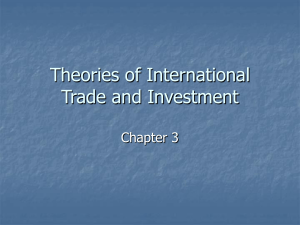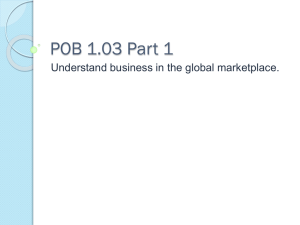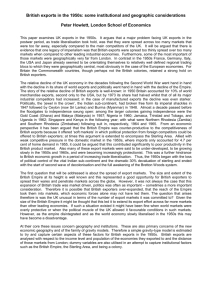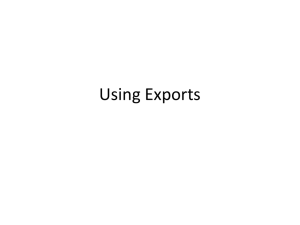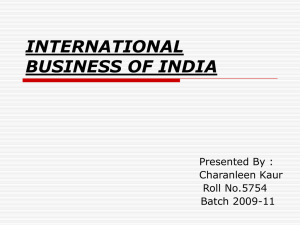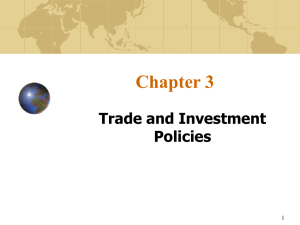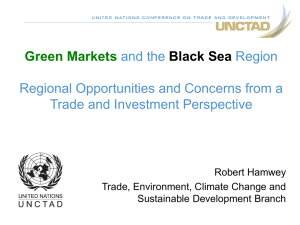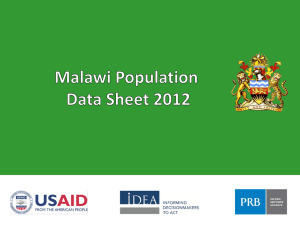EXPORTS MONITORING - Tobacco Control Commission
advertisement
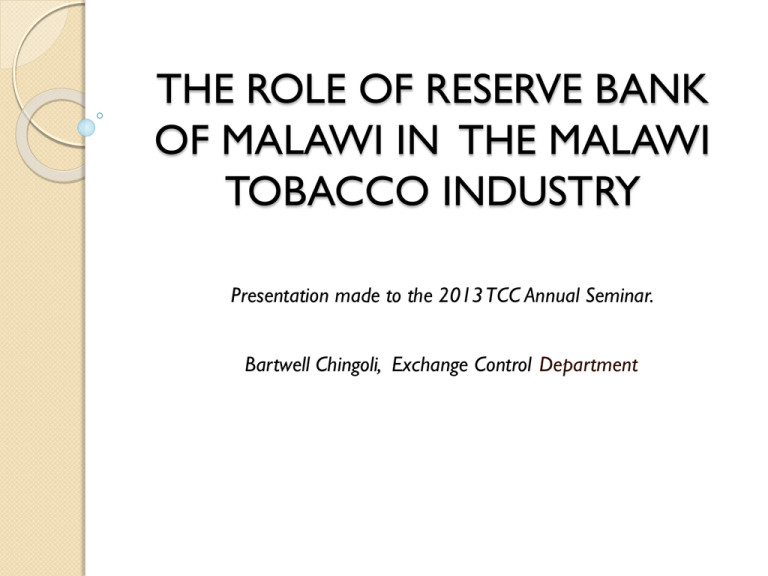
THE ROLE OF RESERVE BANK OF MALAWI IN THE MALAWI TOBACCO INDUSTRY Presentation made to the 2013 TCC Annual Seminar. Bartwell Chingoli, Exchange Control Department OUTLINE RBM as a regulator of the financial sector Financial intermediation Handling of Exports from, the use of FESDS Challenges and Limitations QnA THE REGULATOR OF FINANCIAL SECTOR • • • • Provision of directives and guidelines e.g domestic lending to ensure financial stability Consumer literacy Supervision of commercial banks and other financial institutions Processing of foreign exchange remittances on capital and financial accounts transactions Financial intermediation • • Monetary policy operations to smoothen the foreign exchange and domestic money market Processing and recording Pre-financing deals • Foreign borrowing is still a controlled item in Malawi. This is to ensure correct balance of payment statistics and enable proper planning for foreign obligation • Procurement of major imports (fuel, fertilisers) which have strong impact on the tobacco industry HANDLING OF EXPORTS FROM MALAWI • All export consignments have to be declared in one way or another • Through MRA Form 38 on all exports below US$5,000.00 • Through RBM managed foreign exchange statistical database system (FESDS) for all other exports • Exporters are required to repatriate to Malawi all export proceeds within 180 days from the date the consignment was discharged by MRA REASONS FOR EXPORT DECLARATION • • • Basis for collecting and compiling accurate export statistics necessary for BoP purpose. This is crucial in any international trade For assessing and determining industry worth. To get t a ratio of 15% as contribution to GDP, there must be accurate assessment of the sector vis-à-vis the entire economy. Essential contribution to monetary policy formulation WHY USE FESDS – Background and Rationale The Foreign Exchange Statistical Database System (FESDS) is web based foreign exchange processing facility introduced in Malawi to mainly remove inefficiencies relating to manual processing of exports Became operational on 28 October, 2008. Designed to introduce efficiency in exports declaration and proceeds tracking. Ensures export proceeds repatriation and FESDS MODULES AND USE CD1 Forms Module- this is the part most important to exporters Form E’s-for processing all other foreign exchange remittances by banks FCDA Balances-This is a module being developed to cover movements in foreign currency denominated accounts and will also include all operations of foreign exchange bureaus FESDS - Parties Involved RBM user and administrator Providing technical and business help desk service Ensuring that network traffic to and from FESDS is not affected by congestion or internal ICT policy Acquitting CD1 Forms Putting in place necessary legislation to ensure compliance of FESDS by economic players Providing training to FESDS users FESDS - Parties Involved (Cont’d) MRA users Clearing exports Ensuring that exports are not under-valued Timely discharging of exports in the FESDS as they leav Providing technical and business service desk to handle queries FESDS - Parties Involved (Cont’d) Exporters/importers/clearing agents) Banks – users MALSWITCH – network provider CD1 Form Reconciliation Process Export proceeds must be received in Malawi within 180 days (6 months) of export Banks receive proceeds, capture payment in FESDS, and advise RBM RBM checks payment details and acquits CD1 Form CHALLENGES/ LIMITATIONS System connectivity problems Over- and under-discharging of exports at MRA Non-reconciliation of exports by exporters and banks We are discussing with banks to ensure full application of the system We have intensified training of FESDs users to enhance user acceptance Service desk contacts MRA service desk: 01 822 588 Ext. 3268/3266 or 01 827 029 RBM service desk: 01 770 600 Ext. 4333/4344 MALSWITCH service desk: 01 820 760/ 01 822 444 Ext. 2064/2094/2021 Thank You! Since previous presenters have covered Foreign Exchange issues in detail, Are any More Questions?
